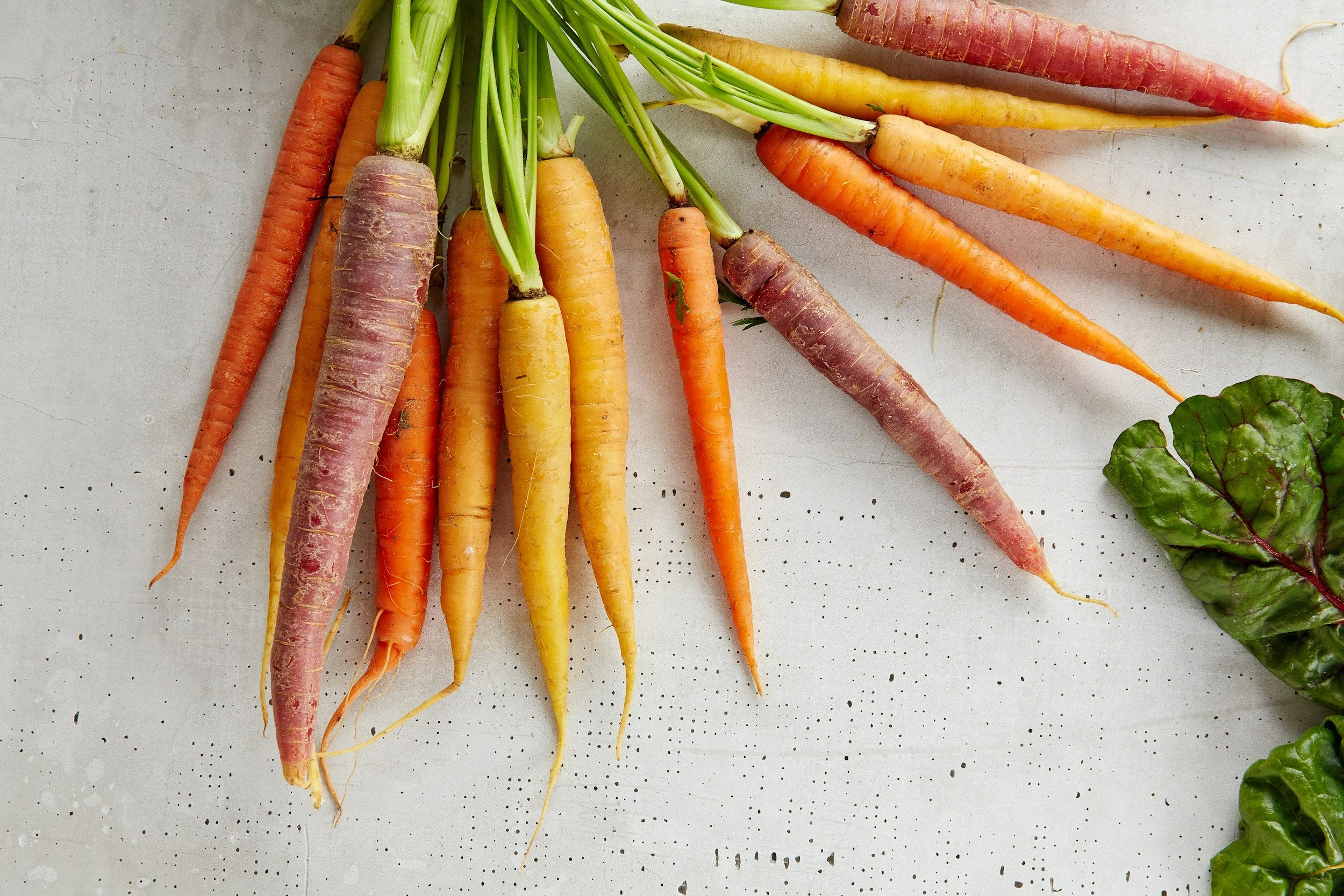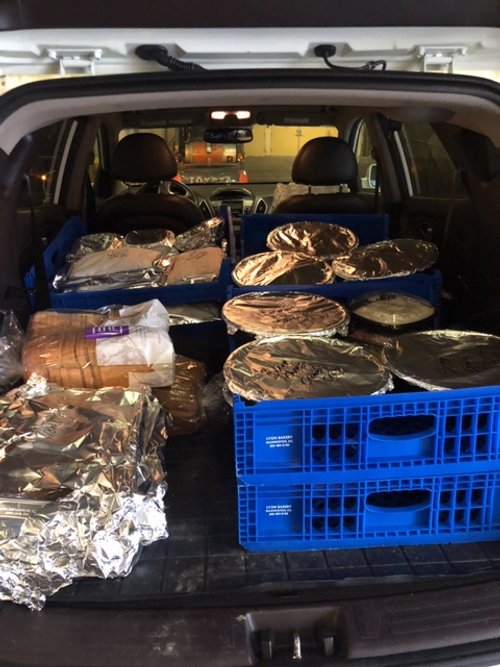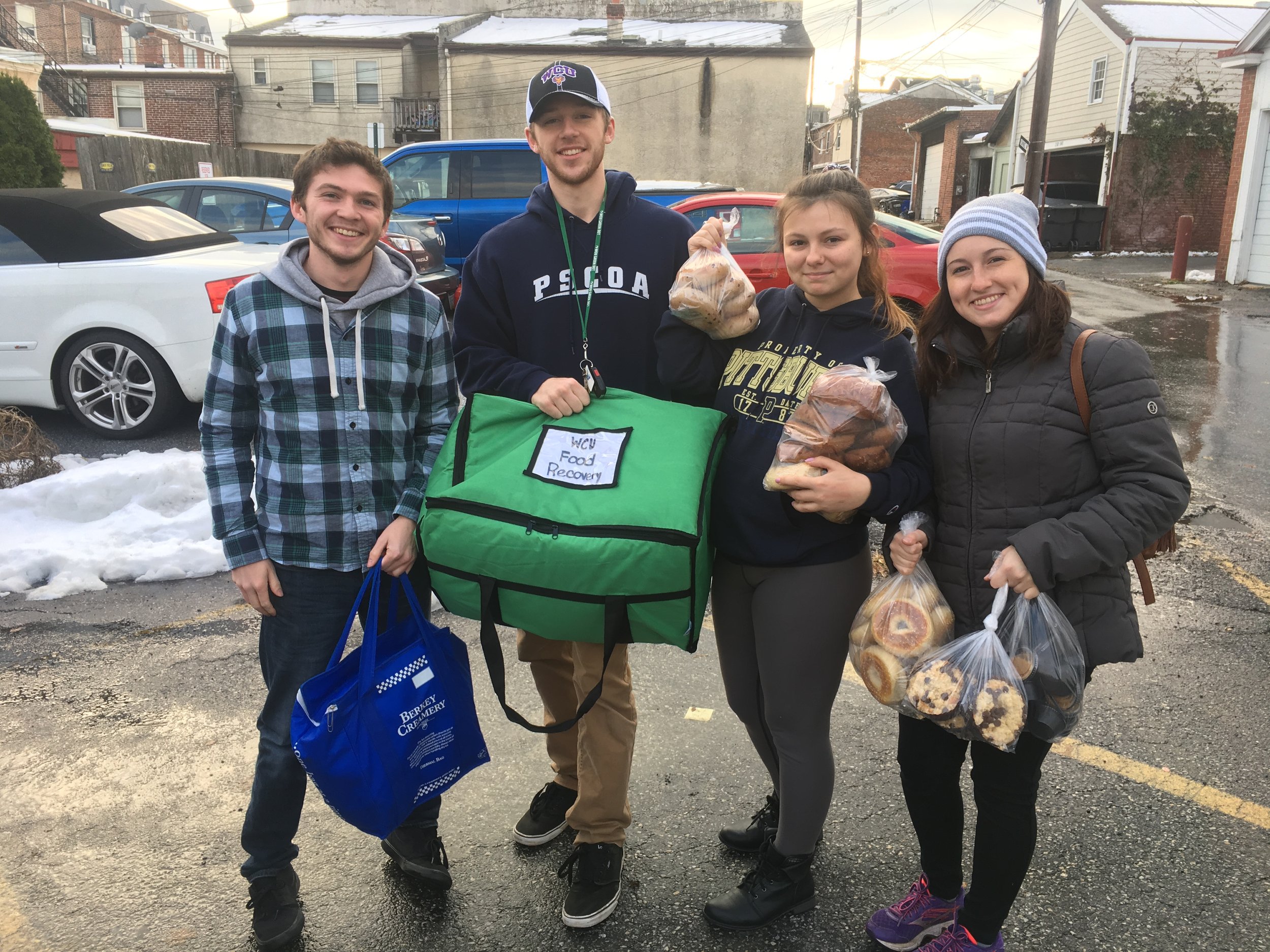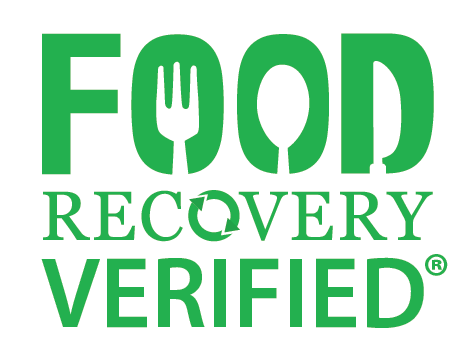
Recently published news and opinions from Food Recovery Network
Student Leaders Step Up to Recover from the Big Game
It’s 6:00 am in Flagstaff, AZ on Sunday, February 12, 2023. It’s quiet and cold, around 30 degrees outside, and the sun isn’t up yet, but eight leaders from Food Recovery Network’s (FRN) chapter at Northern Arizona University (NAU) are awake and gearing up to drive down to Glendale, where Super Bowl LVII will take place in 10 hours.
By 7:00 am, seven students meet their faculty advisor, settle into two cars and while the sun rises, they hit the road to avoid game day traffic on the only two-lane highway down to Glendale. They take a short pitstop at a roadside diner for breakfast and continue the 2 ½ hour drive. By 10:30 am they arrive in Glendale and make their way towards State Farm Stadium. They’ve got their game faces on, but they’re not here for football - they’re here for food recovery.
Just across the street from State Farm Stadium, Bullseye Event Group hosts their annual Players Tailgate, a premier all-inclusive tailgating experience where guests can enjoy unlimited drinks and bites curated by high-profile chefs from across the country and mingle with current and former NFL players before they watch the big game. In preparation for the event, the culinary team purchased nearly 10,000 pounds of food to be served to guests during the 4-hour event.
With all events of this size and scale, it’s imperative to have a plan in place to ensure any surplus food is donated. FRN student and faculty leaders understand the urgency and importance of this work, which prompted the NAU chapter to make the trip to Glendale to support FRN staff members with one of our largest food recoveries of the year.
“It was empowering to participate in this food recovery, realizing that our chapter played such an important role in the process.”
On a normal school day, the students at NAU work with their faculty advisor, the campus Sustainability Director for Sodexo Dining, to donate perfectly good food that was prepared and never served from the Hot Spot, an all-you-care-to-eat resident dining hall on campus. Since reviving its food recovery program in the wake of the COVID-19 pandemic, the NAU chapter has recovered and donated 9,580 pounds of food, equivalent to 7,983 meals, to two local hunger-fighting organizations, the Flagstaff Family Food Center and Sunshine Rescue Mission. FRN staff were delighted to meet the NAU student chapter members and their advisor, who dedicate their time day in and day out to create a more sustainable and equitable food system, in Glendale for our big food recovery.
Now it’s 1:00pm and the Players Tailgate is heating up, figuratively and literally. The sun is high in the sky, chefs are serving up delectable bites, NFL players are mingling, and suddenly Glendale’s very own Mayor Weiers pays a visit. Here on official business, the Mayor invites FRN’s Executive Director, Regina Anderson, and all NAU chapter volunteers to the stage and officially proclaims Sunday, February 12, 2023, Food Recovery Network Day in Glendale, AZ!
“It feels great to be recognized by someone in a high-profile office. To know the Mayor cares about the same things we care about—reducing waste and overcoming hunger—is encouraging. More importantly, it increases awareness of sustainability efforts and encourages others to get involved.”
As the Players Tailgate event comes to an end, football fans migrate to watch the game while FRN staff and our student volunteers suit up for our own game-time kick-off. At 4:30 pm the head chefs give our crew the green light to begin our food recovery work. Swiftly, volunteers organize into an assembly line to move food donations from a refrigerated truck into our vans for delivery to the Phoenix Rescue Mission. Many hands make light work, and within 30 minutes we pack nearly 3,000 pounds of high-quality proteins, seafood, dairy, produce, and condiments into our vehicles.
Upon arrival at Phoenix Rescue Mission, everyone’s spirits are high. With adrenaline pumping, we quickly unload the food from our vans onto 5 palettes that are immediately placed into freezers. As Phoenix Rescue Mission announces the amount of food donated that evening, our group erupts into cheers. Our mini-celebration is filled with laughter, high-fives, compliments, and thanks all around.
A successful food recovery of this magnitude depends on the cooperation and collaboration of many people, especially volunteers. The NAU chapter showed up and showed out for this event! They demonstrated their leadership, integrity, patience, and caring - the very essence of what fuels FRN’s food recovery movement. We could not have achieved this success without their participation. On behalf of the full team at FRN, we thank our volunteers for their commitment and support of this food recovery effort and the incredible work they do every day to combat food waste and food insecurity in their community.
Thank you to our volunteers: Amaya Gooch, Emma Anderson, Fran Alvarado (faculty advisor), Haley Anglin, Jovani Herrera, Karson Hawkins, Kearstin Saxto, and Rachel Lord.
Student Debt Cancellation matters to everyone. Here's Why.
On February 28th, the People’s Rally for Student Debt Cancellation will take place in front of the Supreme Court in Washington, D.C., the same day the Court will begin hearing oral arguments regarding President Biden’s historic student debt cancellation program. Regardless of if you have student debt, you should support this policy because it has a positive economic impact for all Americans.
According to the Education Data Initiative (EDI), student debt greatly impacts the U.S. economy because consumer spending is directly linked to personal finance. EDI states, “Each time a consumer’s student debt-to-income ratio increases by 1%, their consumption declines by as much as 3.7%.” This debt then translates to less participation in the levers which drive the economy. A 2021 National Association of REALTORS study found that often buyers must choose between “investing in their retirement, purchasing a home, getting married, starting a family or general savings.” The same study found that those suffering from housing insecurity often also face food insecurity.
As the cost to attend college becomes more expensive, growing at an annual rate of 7.78%, and the ability to buy a home has been compromised due to the increasing debt of students, the number of students and individuals suffering from food insecurity is a staggering 34 million people, 34% of which are college students.This number can be as high as 71% of “nontraditional” students, meaning students who may be enrolled part time, work full time while in school, be caretakers of dependents, etc.
Historically, going to college has meant better prospects for long-term earning potential, including marginalized groups and as a whole. Mostly, this is still true, with four-year degree holders earning on average $1M more over the course of their career than those with a high school diploma only. However, the student loan burden and earning potential is not distributed equally. The Consumer Financial Protection Bureau found that over 90% of African-American and 72% of Latinx students leave college with student loan debt, compared to 66% of their white counterparts, and 51% of Asian-American students. This debt, combined with the racial wage gap, continues to put students of color at a disadvantage when building a life following graduation.
That is why to help close the racial wealth cap and support the economic security for millions of people, we support the Biden Administration proposal of forgiveness of student loans. We are encouraging all of our 4,000 students, alumni, business leaders and community partners to join Food Recovery Network (FRN) at the rally on February 28th. Regardless of if you have student debt, you are impacted by those who do. 22% of those with student debt put off starting a small business, or buying a home, or having a family - all actions which drive economic growth. Put differently, if the 26 million borrowers who qualify for relief actually receive it, you will benefit from that relief as well because more money will be put into the economy at a time when it is much needed.
Forgiving student debt is a substantial contribution our government can make today to improve the lives of the 42M people with student debt. This action would disproportionately benefit students of color, who carry more debt, but also benefit the middle class because it would begin the “long process of restoring access, solidity and racial equity to the middle class”, the exact promise a college education was originally meant to deliver. Owning a home, saving for retirement, starting a family, would all be more within reach for those who otherwise are putting off those major economic decisions because of student debt.
Poverty is a policy choice. Forgiving student debt is the economic choice.
Katie Jones is the Chief Operating Officer of FRN.
Sources:
https://actionnetwork.org/forms/join-us-at-the-supreme-court?source=naacp
https://www.nar.realtor/newsroom/affordable-housing-concerns-and-food-insecurity-linked-nar-report-finds
https://www.forbes.com/advisor/personal-finance/college-students-food-insecurity/
https://www.feedingamerica.org/research/college-hunger-research
https://www.cnbc.com/2023/02/18/what-a-deeper-than-expected-recession-means-for-your-money.html
https://www.vox.com/the-goods/22297809/student-loan-debt-cancel-forgiveness-middle-class
Celebrating three years of partnership with NAR!
In 2019 Food Recovery Network (FRN) launched a partnership with the National Association of REALTORS® (NAR) which continues to evolve and thrive year after year.
It all began when NAR’s CEO, Bob Goldberg, searched for a way to ensure that all surplus food from NAR events would be donated to feed people. He had learned about FRN through a personal connection at the University of Maryland College Park (where FRN was founded) and asked for our help to put a food recovery plan in place for an upcoming event. Naturally, we obliged!
It was April 2019, and NAR was planning its annual REALTORS® Legislative Meetings and Trade Expo at the Wardman Marriott Park hotel in Washington, DC. Our team members were thrilled to learn that the chef at Marriott was fully committed to reducing food waste, and did his part to save surplus food that could be donated from the event. On the day of the recovery, FRN sent one team member over to the hotel to pick up and deliver 70 pounds of surplus food, approximately 58 meals, to Charlie’s Place, a local hunger-fighting partner that provides meals and essential support to houseless people in the city.
That first event was incredibly successful and showed the potential to build and strengthen our partnership, so we set our sights on a second event, then a third. Since 2019, FRN’s food recovery support for NAR has grown steadily to include food recovery support for an average of 10 NAR and affiliate member events per calendar year.
After building a solid foundation through our event work, FRN’s partnership with NAR has grown to include elements of education, awareness, and advocacy. In 2021, FRN’s Executive Director, Regina Anderson, hosted an insightful conversation with Bob Goldberg and Dr. Jessica Lautz, VP of Demographics and Behavioral Insights at NAR, about the correlation between housing access and food insecurity. NAR produced a formal report on this topic last year to highlight the struggles for affordable housing and food security, how they are connected, and what we can all do to diminish those struggles for millions of people across the United States.
“Powerful partnerships like the one FRN and NAR have fostered ensures people have access to the food they deserve. It’s important that people can see themselves as part of a simple solution to changing the current process of tossing perfectly good food to one of recovering good food and ensuring it can go to those experiencing hardship.”
With NAR, FRN has organically developed an all-encompassing collaboration that continues to flourish because our organizations share a deep commitment to doing what we can to distribute food and to support the 42 million people across the U.S. who don’t have sufficient or consistent access to food. Thank you, NAR, for your incredible leadership and support over the years. We are so grateful to be in partnership with you, tackling large-scale and complex problems together.
We’ve accomplished so much together, and on our three-year anniversary, we can’t help but reflect on all the wonderful milestones we’ve hit!
May 2019 - NAR’s first Food Recovery Verified (FRV) event results in 70 pounds of food donated to Charlie’s Place in Washington, DC
August 2019 - NAR’s CEO, Bob Goldberg, calls on REALTORS to donate surplus food from their events, resulting in 200 affiliate members signing a pledge
December 2019 - FRN & NAR celebrate the impact of their first year of partnership: 7 national and affiliate member events, 309 pounds of surplus food recovered, 258 meals served, 7 communities impacted
March 2020 - In-person events paused as the COVID-19 pandemic sent the nation into lockdown
June 2021 - NAR hosts their first in-person event as COVID-19 restrictions are lifted, resulting in the recovery of 430 pounds of surplus food for St. Matthew’s House in Marco Island, FL
August 2021 - NAR & FRN discuss the link between affordable housing and food insecurity
November 2021 - NAR produces a formal report that links affordable housing to food insecurity
December 2021 - FRN & NAR celebrate the impact of another year of partnership: 8 national and affiliate member events supported, 4,170 pounds of surplus food recovered, 3,475 meals served, 9 communities impacted
February 2022 - NAR sponsors FRN to recover 1,900 pounds of surplus food from Guy Fieri’s Superbowl Tailgate event in Los Angeles, CA
September 2022 - FRN + NAR recover surplus food from their 20th event, resulting in the recovery and donation of 317 pounds of surplus food for the Hollywood Food Coalition and Union Rescue Mission in Los Angeles, CA
November 2022 - NAR + FRN share resources and information for Hunger & Homelessness Awareness Week
December 2022 - FRN + NAR celebrate their third year of partnership: 13 national and affiliate member events supported, 2,764 pounds recovered, 2,303 meals served, 12 communities impacted
Total impact 2019-2022 → 7,488 pounds of surplus food recovered, equivalent to 6,240 meals donated!
From FRN Student Volunteer to FRN Staff Member: Recovering food city to city
Like many of our student leaders, I became involved with Food Recovery Network during college because I had an interest in sustainability and I wanted to make my campus and community a better, more equitable place for everyone. I jumped at the chance to help start an FRN chapter at West Chester University (WCU) and was lucky enough to have the opportunity to be the first president during my last year at WCU and even stayed involved during my first year of grad school.
For anyone who has started an FRN chapter, or became involved early on in the chapter’s existence, you know how much work it is to get a food recovery program up and running. Between coordinating with dining services, recruiting volunteers, and making sure you have transportation to your partner agencies, it really was a struggle sometimes.
However, the struggle was always worth it at the end of each recovery. Being able to provide nutritious food to my fellow students and community members always made every miscommunication, last minute cancellation, and panic solo food recovery worth it.
At the end of our first year as a chapter, we even won the WCU Leadership in Sustainability Award!
Moving From FRN Student Volunteer to Staff Member
I started my FRN National position as Stakeholder Engagement Associate in the beginning of August and it has been an exciting, busy, rewarding whirlwind of a time. Since joining the FRN team, I’ve successfully helped recover and reroute surplus food from all over the United States to serve communities nationwide, coordinating food recoveries both virtually and in person as part of our Food Recovery Verified program.
Compared to my food recoveries at West Chester, FRN National food recoveries feel familiar and different all at the same time. At West Chester, I was active in most of the recoveries during my two years with the chapter, so coordinating virtual food recoveries and not actually being there in person to recover the surplus food myself was foreign to me.
Yet each time a new conference, Gala, or business event successfully donates their surplus food with our virtual support, I’m reminded just how easy it would be for other businesses to do the same. We don’t need FRN staff in place to perform recoveries when we can coordinate with local FRN chapters and hunger-fighting partners in the community that are committed to ensuring all surplus food is donated.
In-the-field with the FRN National Team
In a slightly more familiar sense, I recently had the opportunity to travel to Indianapolis to help recover and donate surplus food from the NFL Colts VIP Tailgate Parties this past fall. This was my first in person food recovery as part of the FRN national team, and it was exciting to travel to a new place to do something I’m passionate about.
Actually being on the ground transporting food for donation brought me right back to 2018 when I was picking up surplus food from my campus dining hall to bring to our chapter’s hunger-fighting partner agency. At the end of our Indianapolis food recovery efforts, our team successfully recovered and transported over 450 pounds of food to our local partner agency, Wheeler Mission.
In November, I was also able to do a solo food recovery in Philadelphia for the National Association of Realtors Conference, where 250 pounds of surplus food was donated and distributed to the local community. I even helped run a super cool fresh produce pop up market in Atlanta as part of FRN’s gleaning initiative this month!
While food recovery work with FRN National may look a little different than it did in college, (and may involve hopping on a plane or two), at the end of each recovery, the feelings are the same - I am overjoyed that I get to spend my days ensuring people across the U.S. have access to nutritious food.
Our work is not always easy, but it’s always worth it. Our team is currently planning out our 2023 support for nationwide events, and I can’t wait to continue my journey in fighting food waste and feeding people and see where this next year takes me!
FRN Chapter Spotlight: Utah State’s Gleaning Program 🍏
Throughout the month of December, FRN is celebrating and raising funds (which will be matched by fairlife through 12/31/22) in support of our nationwide network of 180+ student-led chapters across the U.S. that recover surplus food, support their neighbors and local communities experiencing hunger, and mobilize their peers to advocate for and build a more sustainable food system and future.
Today, we are highlighting one chapter among the many. Follow along on our social media (@foodrecovery) throughout the month of December to witness many more highlight stories of our dedicated student leaders nationwide.
Food Recovery Network at Utah State University
Food Recovery Network at Utah State University activates through a student-run gleaning program called Cache Community Gleaning. Their student volunteers harvest excess fruit from local tree and garden owners and donate that food to hunger-fighting partners in their community. Their gleaning program started in 2018 as a way to reduce surplus food, and they have since gleaned and donated over 151,900 pounds of produce to date. Click here to watch and learn more about their gleaning program directly from student volunteers.
In a recent conversation with Kate, Utah State FRN Chapter Leader, she shared this incredible story highlighting the impact of their chapter:
“This year’s apricot season was slow and a lot less bountiful than previous years in Cache Valley. Because of this, there were some weeks that we struggled a bit more than usual to find properties to glean at. One particular week I (Kate) had driven out to a more rural part of the valley to scout out some properties we were hoping to glean that day and later that week. As I arrived at one of the properties, a nature preserve, that we were anticipating a large harvest, I found that all the apricot trees were completely barren of fruit. A little beside myself, I made my way to another property in the area to see if their tree had much of a yield for us. Along the way I missed a turn and ended up driving down a very remote dirt road with one house along a large stretch of land. There, outside of the solitary house, was a big, beautiful apricot tree that obviously was dropping fruit quickly. I stopped and knocked on the door of the house and a very kind elderly woman answered. I told her about our program’s services and offered to bring a team of gleaners out to pick and donate her fruit for her if it was something she would be interested in. She was thrilled to have us come, sharing that she had hoped to have the tree removed before the fruit came on but wasn’t able to in time. We picked hundreds of pounds of gorgeous fruit from her tree and it was enjoyed by many.”
Your support of FRN’s programs helps our team to mobilize, train, and supply our student-led chapters across the U.S. to recover more food faster from college and university campuses, businesses, and farms across the United States.
Today through 12/31, your donation to FRN will be doubled by our partner, fairlife.
And be sure to follow along on our social media (@foodrecovery) through December to see how other FRN chapters are fighting food waste and supporting their communities across the U.S.




















